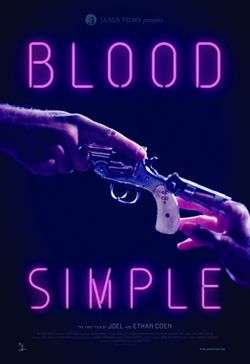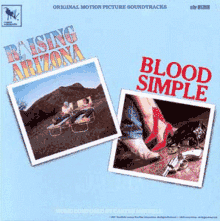Blood Simple
| Blood Simple | |
|---|---|
 Theatrical re-release poster | |
| Directed by | Joel Coen |
| Produced by | Ethan Coen |
| Written by |
Joel Coen Ethan Coen |
| Starring | |
| Music by | Carter Burwell |
| Cinematography | Barry Sonnenfeld |
| Edited by |
|
Production company |
|
| Distributed by | Circle Films |
Release date |
|
Running time | 96 minutes[1] |
| Country | United States |
| Language | English |
| Budget | $1.5 million |
| Box office | $3.8 million[2] |
Blood Simple is a 1984 American neo-noir crime film written, edited, produced, and directed by Joel and Ethan Coen. It was the directorial debut of the Coens and the first major film of cinematographer Barry Sonnenfeld, who later became a noted director, as well as the feature film debut of Joel Coen's wife Frances McDormand, who subsequently starred in many of his features.
The film's title derives from the Dashiell Hammett novel Red Harvest (1929), in which the term "blood simple" describes the addled, fearful mindset of people after a prolonged immersion in violent situations.[3]
In 2001, a director's cut was released. It ranked No. 98 on AFI's 100 Years...100 Thrills. The film also placed No. 73 on Bravo's 100 Scariest Movie Moments.
Plot
Abby and Ray are driving through a heavy downpour at night, discussing Abby's bad marriage. Ray drives to a motel, where he and Abby have sex. Abby's husband, Julian Marty, has hired a private detective, Lorren Visser, to follow Abby. Visser takes photos of the tryst and delivers them to Marty. Ray is a bartender working at Marty's bar.
Marty is humiliated when his attempt to kidnap Abby from Ray's home fails, so he then hires Visser to kill the couple. Visser breaks into Ray's home, steals Abby's gun, and photographs the sleeping couple through the bedroom window. He presents a doctored photo of the couple's "corpses" to Marty as evidence that they have been killed. Marty goes to the bathroom to vomit then opens the safe to give Visser his fee. Visser shoots Marty with Abby's gun, leaving her gun at the scene as evidence that she killed Marty.
Ray returns to the bar and accidentally kicks Abby's gun, firing it. He finds a motionless Marty and decides to cover up the murder, which he assumes Abby has committed. He loads the body into his back seat and puts Abby's gun in the coat pocket. While Ray is driving down a country road at night, he realizes that Marty is still alive, although badly wounded. Ray buries Marty alive, but not before retrieving the gun.
A distraught Ray tells Abby, "I cleaned up your mess." Abby insists she "hasn't done anything funny." By the time Ray leaves Abby's apartment each is convinced that the other has done something to harm Marty. Ray leaves the gun, now containing one round, with Abby.
Visser observes first Abby and later Ray visiting the bar office. When leaving the bar Ray notices that he is being followed and leaves for Abby's apartment realizing that she might be in danger. After Abby arrives, Visser, firing from a nearby rooftop with a rifle, shoots Ray through the window. When Abby hears footsteps approaching she quickly takes Ray's knife and hides in the bathroom. Visser enters the bathroom to kill her, but finds the bathroom empty and the window open. Reaching out the window, he opens another window to the next room, but Abby slams the sash down on his wrist and drives the knife through his hand into the sill. He shoots through the wall, then punches through it and removes the knife, while Abby retreats and waits outside the bathroom, holding her gun. As Visser is about to emerge, she fires through the door, hitting him. Abby states she "Isn't afraid of you Marty". Visser, lying on the bathroom floor, mortally wounded, bursts into laughter and responds by saying he'll "let him know if he see's him." as Abby is horrified at the realization it isn't Marty.
Cast
- John Getz as Ray
- Frances McDormand as Abby
- Dan Hedaya as Julian Marty
- M. Emmet Walsh as Lorren Visser
- Samm-Art Williams as Meurice
Funding
The Coen brothers took the trailer they made – which showed "a man dragging a shovel alongside a car stopped in the middle of the road, back towards another man he was going to kill" and "a shot of backlit gun holes in a wall"[4] – and a projector and went around to people's homes and work places to show it. Daniel Bacaner was one of the first people to invest money in the project. He also became its executive producer and introduced the Coens to other potential backers. The entire process of raising the necessary $1.5 million took a year.[5]
Production
The film was shot in several locations in the towns of Austin and Hutto, Texas over a period of eight weeks in the fall of 1982. The film spent a year in post-production and was completed by 1983.[6]
Blood Simple was Frances McDormand's screen debut.[4]
Reception
While the film was only a modest box office success, it was a huge critical success. It currently holds a 94% "fresh" rating on Rotten Tomatoes, where the critical consensus reads: "Brutally violent and shockingly funny in equal measure, Blood Simple offers early evidence of the Coen Brothers' twisted sensibilities and filmmaking ingenuity."[7] The movie made about $3 million. Its first big public viewing was the USA Film Festival in Dallas, followed by the Sundance Film Festival, where it received the Grand Jury Prize. The brothers took the film to the Toronto Film Festival, Cannes, and the New York Film Festival. They were very proud of their film, particularly in light of having raised the funds using their self-made trailer.[8]
The film is recognized by American Film Institute in these lists:
- 2001: AFI's 100 Years...100 Thrills – #98[9]
Director's Cut and home media
VHS Versions
The original MCA Home Video VHS tape and LaserDisc was released on October 10, 1985, with a 96-minute running time.[10]
The film was released on Universal Pictures Home Entertainment VHS tape for a second time in 1995 with a 99-minute running time.[11]
Unusual for such an exercise, the "Director's Cut" is some three minutes shorter than the original 1985 theatrical release. The Coens reduced the running time with tighter editing, shortening some shots and removing others altogether. Additionally, they resolved long-standing rights issues with the music: the original theatrical version of the film made prominent use of The Four Tops' "It's the Same Old Song" (1965); the Coens had replaced it with Neil Diamond's "I'm a Believer" (1966) for the 1995 U.S. home video edition on VHS. The Director's Cut reinstated the Four Tops track.[12]
2001 DVD release
The 2001 DVD release features several spoofs of DVD "special features". One is an introduction to the film by fictional film historian "Mortimer Young", who claims the "Director's Cut" removes some of "the boring bits" and adds other parts; this was also included in the theatrical release of the "Director's Cut". It was also re-released on VHS in 2001.
The 2001 DVD release also includes an audio commentary by "Kenneth Loring", the fictional artistic director of the equally fictional "Forever Young Films". Loring offers several entirely spurious "facts": for example, he claims the scene with Ray and Abby driving in the rain, talking about Marty, was acted out in reverse as well as upside down, to synch the headlights of the passing car just as certain lines were said. (He claims filming the scene backwards and upside down was the logical choice to get the timing right, and the actors are wearing hair spray to keep their hair pointing "down".) Elsewhere in the commentary, he claims that, in scenes with both dialogue and music, the actors simply mouth the words and record them in post-production, so they won't interfere with the music; that Marty's dog is animatronic; that the sweat on various actors is "movie sweat", gathered from the flanks of Palomino horses; that Fred Astaire and Rosemary Clooney were at one time intended for the film; and that a fly buzzing about is not real, but the product of computer generated imagery. "Loring" is voiced by actor Jim Piddock, using a script written by the Coen brothers.
Box Sets
In 2005, Universal Pictures Home Entertainment released The Coen Brothers Collection DVD box set that included the 2001 version. Then in 2007, MGM Home Entertainment released The Coen Brothers Movie Collection DVD box set that included a version with no special features. The DVD was sold separately in 2008. Finally in 2011, 20th Century Fox Home Entertainment released the From the Minds of the Coen Brothers Blu-ray Disc box set, which included the mock commentary track. The Blu-ray Disc was sold separately as well.
Criterion Collection
In June 2016 the Criterion Collection announced they would be releasing Blu-ray Disc and DVD special editions of the film in September with a new 4K digital transfer supervised and approved by Barry Sonnenfeld and the Coens, along with various new special features.[13]
Soundtrack
| Original Motion Picture Soundtracks: Raising Arizona and Blood Simple | ||||
|---|---|---|---|---|
 | ||||
| Soundtrack album by Carter Burwell | ||||
| Released | 1987 | |||
| Genre | Film score | |||
| Length | 39:26 | |||
| Label | Varèse Sarabande | |||
| Coen Brothers film soundtracks chronology | ||||
| ||||
| Professional ratings | |
|---|---|
| Review scores | |
| Source | Rating |
| AllMusic | |
Carter Burwell wrote the Blood Simple score, the first of his collaborations with the Coen brothers. Blood Simple was also the first feature film score for Burwell; and after his work on this film, he became a much-in-demand composer in Hollywood.[15] By 2016 he had scored 16 of the Coen brothers' films.[15]
The score for Blood Simple is a mix of solo piano and electronic ambient sounds. One track, "Monkey Chant", is based on kecak, the "Ramayana Monkey Chant" of Bali.[16]
In 1987, seven selections from Burwell's Blood Simple score were released on a 17-track album that also features selections from the soundtrack of the Coens' next film, Raising Arizona (1987).
Blood Simple selections on the 1987 album:
- "Crash and Burn" (2:40)
- "Blood Simple" (3:33)
- "Chain Gang" (4:47)
- "The March" (3:34)
- "Monkey Chant" (1:04)
- "The Shooting" (2:52)
- "Blood Simpler" (1:22)
Other songs from the film that are not on the album:[1]
- "It's the Same Old Song", written by Eddie Holland, Lamont Dozier and Brian Holland, performed by The Four Tops
- "Louie Louie", written by Richard Berry, performed by Toots & the Maytals
- "The Lady in Red", written by M. Dixon and A. Wrubel, performed by Xavier Cugat and his Orchestra
- "Rogaciano"
- "He'll Have to Go", written by Joe Allison and Audrey Allison, arranged by Jim Roberge, performed by Joan Black
- "El Sueno", written by Camilo Namen, performed by Johnny Ventura y su Combo
- "Anahi" performed by Maria Luisa Buchino and her Llameros
- "Sweet Dreams", written by Don Gibson, performed by Patsy Cline
Chinese remake
In December 2009, Zhang Yimou released a Chinese remake of the film. The film, titled A Simple Noodle Story (known internationally as A Woman, a Gun and a Noodle Shop), is set in a Chinese noodle shop in a desert and revolves around the restaurant owner's plan to murder his adulterous wife and her lover.[17]
See also


References
- 1 2 Blood Simple at the American Film Institute Catalog
- ↑ "Blood Simple (1985) - Box Office Mojo". Retrieved 14 July 2016.
- ↑ Falsani, Cathleen. (2009). The Dude Abides: The Gospel According to the Coen Brothers. Grand Rapids, MI: Zondervan. p. 31.
- 1 2 Ferarra, Greg "Blood Simple (1984)" (article) TCM.com
- ↑ Robson, Eddie (2003). Coen Brothers. Great Britain: ebooks. ISBN 9780753547700.
- ↑ Marsh, Calum (January 15, 2015) "How 'Blood Simple' Stated A 30-Year Hollywood Firefight" Maxim
- ↑ "Blood Simple (1984)". Rotten Tomatoes. Retrieved July 4, 2014.
- ↑ Levine, Josh. The Coen Brothers: The Story of Two American Film Makers. Canasa: ECW Press. pp. 17–30. ISBN 1-55022-424-7.
- ↑ "AFI's 100 Years...100 Thrills" (PDF). American Film Institute. Retrieved August 20, 2016.
- ↑ http://www.lddb.com/laserdisc/01993/40180/Blood-Simple
- ↑ VHS cover (image)
- ↑ Beckett, David (March 27, 2013). "Blood Simple – Director's Cut (2013) DVD". Film 365.
- ↑ "Blood Simple". Retrieved 14 July 2016.
- ↑ Blood Simple at AllMusic
- 1 2 Greiving,Tom (2016). Love The Music of Coen Brothers Films? You Can Thank Carter Burwell". Music News, National Public Radio (NPR), February 7, 2016. Retrieved May 15, 2017.
- ↑ Bakan, Michael B. (2009). "The Abduction of the Signifying Monkey Chant: Schizophonic Transmogrifications of Balinese Kecak in Fellini's Satyricon and the Coen Brothers’ Blood Simple, Ethnomusicology Forum, volume 18, Number 1, May 28, 2009. Retrieved May 16, 2017.
- ↑ Graser, Marc (28 July 2009). "SPC to distribute Yimou's 'Blood': Chinese director remaking Coen brothers' pic". Variety. New York: Reed Business Information. Retrieved 30 November 2011.
External links
| Wikiquote has quotations related to: Blood Simple |
- Blood Simple on IMDb
- Blood Simple at the American Film Institute Catalog
- Blood Simple at the TCM Movie Database
- Blood Simple at AllMovie
- Blood Simple at Box Office Mojo
- Blood Simple at Rotten Tomatoes
| Awards | ||
|---|---|---|
| Preceded by Old Enough |
Sundance Grand Jury Prize: U.S. Dramatic 1985 |
Succeeded by Smooth Talk |